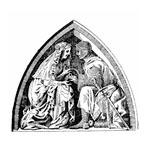
Will There Be Sex in Heaven?
THE SEVEN-HUSBANDS QUESTION REVISITED
The notion that after death there is a resurrection of the body has been a “stumbling block” and “folly” to various people throughout history (cf. 1 Cor. 1:23-24). We find a notable example in a story repeated in the three Synoptic Gospels about a challenge posed to Jesus by the Sadducees, who, as a group, did not believe in the resurrection (cf. Mt. 22:23-34; Mk. 12:18-27; Lk. 20:27-40). The conundrum they pose to Him involves a woman who has had seven husbands, each of whom died. After the wife dies, at the resurrection, if they all rise from the dead, whose wife will she be?
The Sadducees are not asking this question because they really want to know; they’re trying to trap Jesus. My students have asked me a similar question over the years, though what they usually have on their minds is the question of sex. Will the husband or husbands who died first feel that the wife has been unfaithful? In Heaven, do they all, well — and here my students often demur, until they finally can find no other way to say this — share her? It is touching to think that, even in our supposedly “sexually liberated” society, this prospect still troubles them.
Jesus’ reply to the Sadducees is enigmatic, as was His custom with all those whose questions were puzzles-to-trap rather than means-to-truth. “As for the dead being raised,” He tells His inquisitors, “have you not read what was said to you by God, ‘I am the God of Abraham, and the God of Isaac, and the God of Jacob’? He is not God of the dead, but of the living.” When the crowd heard it, Matthew tells us, “they were astonished at his teaching” (Mt. 22:31-33).
Consider the power of Jesus’ reply; it might not be immediately apparent to us now. Throughout the Old Testament, we find repeated references to “the God of our fathers,” the “God of Abraham, Isaac, and Jacob.” The very land in which the Jewish people resided was described by God Himself as “the land which I have sworn to your fathers” (Judg. 2:1), “the land which I swore to give to Abraham, Isaac, and Jacob” (Exod. 6:8). If the Sadducees admitted that Abraham, Isaac, and Jacob were no longer in existence, then would not those promises have died with the men to whom they were made? Or if the Sadducees had claimed, in Platonic fashion, that the bodies of their fathers had been left behind, while it was only their spirits that remain alive in God, then why would the physical land be such an important part of the promise? If the material body is unimportant, then certainly physical land could be no more important.
You May Also Enjoy
Instead of frittering away his time, a young man needs to take charge of his livelihood and plan his own family-centered home economy.
Evil spirits, often in a very subtle manner, have been far more clever and more destructive of sound spiritual thinking than generally supposed.
It entirely translates and edits out the Bible’s teaching on fornication, and renders the doctrine of Hell if not invisible, then opaque.

